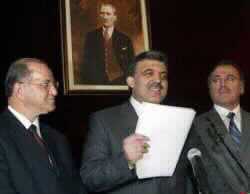Turkey's Justice and Development Party (AKP) took office on Monday after the president approved the cabinet list with little to surprise nervous financial markets and Western allies. The AKP, which won by a landslide on November 3, says it has broken with roots in two banned Islamist parties. Its leader, Tayyip Erdogan, remains barred from office due to a conviction for inciting religious hatred but his right-hand man, Abdullah Gul, was named prime minister on Saturday.
His government will have to work fast to win the confidence of financial markets and the European Union as it works to implement a DLRS. 16 billion IMF rescue package and reforms sought by Brussels as conditions for discussing Turkish EU membership.
Gul said Ali Babacan, a 35-year-old Western-educated former financial consultant, would be economy minister in a move likely to reassure markets.
"We have already made known that we are open to dialogue, that we are going to continue this (IMF) program's main planks," Babacan told NTV television.
Yasar Yakis, a career diplomat who was on Monday accompanying Erdogan on trips to Athens and Madrid on Monday to drum up support for Turkey's EU bid, will be foreign minister.
The defense minister, whose influence is balanced by that of powerful generals wary of any Islamist threat to secular traditions, will be Vecdi Gonul, a former Interior Ministry undersecretary who is close to President Ahmet Necdet Sezer.
Observers say the AKP is unlikely to change NATO member Turkey's policy toward Iraq, which faces the threat of war from the United States. Turkey is expected to provide support to Washington if the United States does go to war.
Babacan recently pledged the AKP would keep the banking watchdog independent from political influence, saying regulation of the sector that was at the heart of two financial crises was "one of the most important" factors for Turkey's recovery.
Gul's government has 25 ministers, including the prime minister, meeting AKP pledges to cut the number of ministerial posts by around 10 to streamline the administration.
The government must now win a confidence vote but that should be a formality given AKP's large majority in parliament.
Abdulkadir Aksu, a former police official from the southeast, will be interior minister, playing a key role in human rights reforms needed to meet EU membership criteria. Gul named three deputy prime ministers: Ertugrul Yalcinbayir, a lawyer who moved to the AKP from the center-right Motherland Party; Abdullatif Sener who was finance minister in a 1996 Islamist-led government; and Mehmet Ali Sahin, an Istanbul member of parliament among the founding members of the AKP.
Ali Coskun, who had been among those tipped as a possible economy minister, was given the trade and industry portfolio.
The finance minister will be Kemal Unakitan who was an adviser of Erdogan when he was mayor of Istanbul.
Erkan Mumcu, another former Motherland deputy seen with an outside chance for a top job, will be education minister.
PHOTO CAPTION
Turkish Prime Minister Abdullah Gul (C) is flanked by his deputy prime ministers Ertugrul Yalcinbayir (L) and Mehmet Ali Sahin as he reads out his newly-approved cabinet list in the press office of the presidential palace in Ankara November 18, 2002. (Reuters)
- Author:
& News Agencies - Section:
WORLD HEADLINES


 Home
Home Discover Islam
Discover Islam Quran Recitations
Quran Recitations Lectures
Lectures
 Fatwa
Fatwa Articles
Articles Fiqh
Fiqh E-Books
E-Books Boys & Girls
Boys & Girls  Hajj Rulings
Hajj Rulings Hajj Fatwas
Hajj Fatwas














